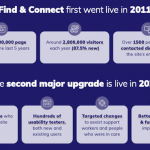As part of our ongoing site improvements (read about our language policy and our consultation into understanding child welfare records), we’re looking at all the resources we provide and how we can make them more useful, and more accessible.
We know that accessing records of time in ‘care’ can be incredibly difficult and distressing for the person those records were created about, for many reasons. Working closely with people who were in “care” as children has shown us that it can be difficult for Care Leavers to find out if there may be records, where those records may be, and how to access them if they exist. Find and Connect was established to provide information about where records are held, and also on how to access those records.
To help achieve that aim, we’ve developed a new resource for those who are considering trying to locate their records. If you or some-one you know wants to access records of their time in “care”, here are some things to consider when starting down that path.
Your Records: What to Expect
 Organisations that provided ‘care’ to children (like children’s homes and orphanages) created records to help them in their work. If you spent time in an institution as a child, there may be records about your time in ‘care’ that have been kept. You can access these records.
Organisations that provided ‘care’ to children (like children’s homes and orphanages) created records to help them in their work. If you spent time in an institution as a child, there may be records about your time in ‘care’ that have been kept. You can access these records.
What will I find?
The records kept and the information recorded will vary, depending on when you were in ‘care’, what sort of institution you were in, the policies and practices of different providers, and even the personal habits of different staff members keeping records.
Records were primarily for administrative purposes, and may not provide the information that is most important to those trying to make sense of their past. Some of them are negative or derogatory about children and their families.
Older records may be superficial, inaccurate, or incomplete, and leave many questions unanswered. In some instances, the only available records may be the admission and discharge record.
How will I feel?
Accessing records can be a difficult, emotional experience. You may feel anger, hurt and loss. You may find the records don’t hold the answers you’re looking for, or that you were lied to, or had information withheld from you by the institution. Records can be negative and harmful. They may also fill in holes in a person’s identity, or bring back long-lost memories. They may provide a way for you to reconnect with those who were also in ‘care’ and find childhood friends. There are services that can support you through accessing your records. If you choose not to use one of those, it is important to have some-one who cares about you with you when you first access your files.
No personal file?
Not everyone will be able to find personal files. Records were not always kept, or have been lost or destroyed. But there are other ‘organisational’ records that may help fill in the gaps – annual reports, minutes of meetings and photographs can remind you of things you’d forgotten, or confirm existing memories.
What are my rights?
You have a right to request access to records if they contain information about you. Different laws relating to privacy and freedom of information apply in each state and territory, and depend on whether the records are in the custody of a government department, or held by a past or current care provider.
You may be given the opportunity to add information to the files as a way of completing the picture, and making sure that your voice is included in files about you.
In the case of other people’s records, for example a sibling or parent, you can access those parts of the file that contain information about you. You might find that your access to some information in the records (yours and other people’s files) is restricted, because of the interpretation of privacy or freedom of information legislation. Usually, it is information about ‘third parties’ – meaning people other than yourself – which you may not be permitted to see. In the case of government records, there are formal avenues to appeal any information that is exempted from the file and these appeal rights are outlined when records are provided.
For more information about accessing your records, you can go to https://www.findandconnect.gov.au/information-about-records.
Need a hand?
There are Find & Connect organisations in every state and territory that have been established to support people who were in “care” find and access their records, or provide whatever support might be needed after some-one had accessed their records.
You can find the service in your state or territory at: https://www.findandconnect.gov.au/contact
You can download the information above (in brochure/3 column) format, go to: https://www.findandconnect.gov.au/resources/what-to-expect-when-accessing-records/





